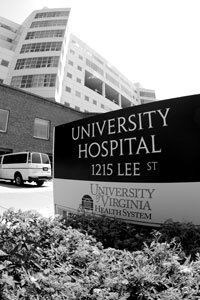Bad lab? Meningitis firm sent meds to Charlottesville
Some drugs from the Massachusetts-based company blamed for causing a meningitis outbreak that has killed at least 24 people have turned up in Charlottesville. According to the federal Food and Drug Administration, drugs from the New England Compounding Center, located in Framingham, have made their way to local facilities, including the University of Virginia Medical Center.
"We are aware of the situation involving the medications shipped from the New England Compounding Center," says UVA Heath Systems spokesperson Eric Swenson, saying the hospital "pulled from usage" any drugs that were purchased from the company following an FDA announcement earlier this month.
The FDA asserts that the meningitis outbreak is confined to patients who received a back pain-relieving spinal injection of a steroid called methylprednisolone acetate. The outbreak has sickened 317 Americans and killed at least 23, including four here in Virginia.
The FDA notes that the only places in Virginia to receive the tainted spinal steroid were two clinics in the Roanoke Valley, but as a precaution the FDA has requested a recall of all products the company distributed since May 21.
Earlier this week, a federal and state inspection found evidence of "black fungus specks" in vials of medicine at the New England Compounding Center. Inspectors also encountered a leaky boiler and dirty equipment, and they assert that the lab was not properly sterilizing its products. What's more, the family owning the facility also operates a trash-recycling center on the same property as the lab. Operations at the lab's parent pharmaceutical company, Ameridose, have been suspended pending further investigation.
According to a recent report in the New York Times, the family-owned firm may have been playing fast and loose with regulations while generating profits that allowed its founders to afford a $4.2 million Boston penthouse, a $3.5 million 11,000 square-foot home in Southborough, Massachusetts with an indoor saltwater pool, and a $2.5 million Cape Cod vacation home.
“It was a license to print money,” a former Ameridose manager told the Times. “I’ve never seen a business grow so fast.”
On October 4, the FDA asked medical professionals to "retain, secure, and withhold from use" any products from the company, and two days later ordered the voluntary recall.
The FDA has advised patients to "remain vigilant for the signs and symptoms of infection" if they got an injection or used any other product from the company that was shipped on or after May 21, and to contact their doctor if they become concerned. A more detailed advisory is available at www.fda.gov/Drugs/DrugSafety/FungalMeningitis/default.htm.
According to a document released by the FDA, four local purchasers received regulated products from the Massachusetts company after May 21. They are listed here:
- UVA Medical Center: Avastin (used with chemotherapy to treat cancer) and Mitomycin (an intravenous medicine used to treat cancer)
- Monticello Community Surgery Center: Mitomycin and Pe/Cyclo/Trop/Ketor (an eye medication)
- Augusta Eye Associates: Avastin
- Moxie Hair Salon: Triple Anesthetic Cream, a combination of benzocaine, lidocaine, tetracaine and phenylephrine that numbs the skin for things like botox treatments
Moxie owner Todd Toms says he was aware of the recall, but says that none of his customers were administered the cream. As Toms explains, the cream, used to numb the skin after, say, a botox treatment, had to be administered by a doctor the salon works with, and that doctor voluntarily stopped using the product.
"We use an entirely different product for things like hair removal," says Toms, "the other cream was too strong."
UVA's Swenson says the hospital has sent letters to around 150 patients who received medications produced by the company between May 21 and October 4, detailing symptoms of a possible infection and instructing such patients to immediately contact their healthcare provider if symptoms emerge. The letters also provide a toll-free number at UVA Health System for patients to call with questions or concerns.
"At this point," says Swenson, "there has not been a confirmed infection linked to any of the medications used at UVA that were purchased from NECC."
Swenson says that UVA has also sent a letter to patients who received injections of methylprednisolone acetate at UVA to reassure them that the steroid they received was not purchased from NECC.

6 comments
"The FDA notes that the only places in Virginia to receive the tainted spinal steroid were two clinics in the Roanoke Valley..."
It seems that a lot more than two clinics are at risk based on the FDA's list. Is this the information in the FDA's list that is sorted by Name?
"Bad lab" naturally made me think of a chemistry teacher in a Bounder RV....
If only we could get the government off their backs with all that regulation; we could create JOBS! Oh wait, there's that public safety thing.
When Bayer knowingly shipped out thousands of vials of AIDS and Hep C contaminated factor 8, giving thousands AIDS and Hep C, did it get this kind of national coverage? Only in European nations.
This is disgusting - FDA report released today
" The FDA found a leaking boiler surrounded by a wet floor with soiled debris 30 feet from a medicine prep room, mold and bacteria in clean rooms and greenish, yellowish residues on processing equipment at the Massachusetts compounding pharmacy."
http://www.tennessean.com/article/20121026/NEWS07/310260137/FDA-releases...
And these problems here may be the tip
of the iceberg . Instead of cutting millions from the FDA I think Congress needs to step up the oversight .
"Manufacturing problems appear to affect many compounding pharmacies, whose products are not routinely tested by safety and effectiveness, as are the drugs made by major manufacturers. State regulatory tests in Missouri and Texas found that up to 25 percent of randomly sampled compounded drugs failed potency tests. And tests by the Food and Drug Administration on a limited number of drug samples from compounding pharmacies found that roughly a third of the products failed quality tests."
http://www.nytimes.com/2012/10/26/opinion/deeper-concerns-about-the-meni...